#today is four days of the Omer
Text
*ISRAEL REALTIME* - "Connecting the World to Israel in Realtime"
▪️LEBANON… all morning, the IDF has been attacking Hezbollah targets in southern Lebanon, an extensive attack on Hezbollah's infrastructure. IDF airstrikes in Aya Ash Shab. 4 consecutive attacks a short time ago against the villages of Yither and Beit Leaf. 6 consecutive attacks from the air were recorded a short time ago near the village of Ita al-Sha'ab in southern Lebanon.
▪️GAZA… continued battles in Jaljilya, north Gaza, with supporting airstrikes. As well around Khan Yunis in south Gaza. Two hero soldiers fell in battle. And again reports Gaza phone and internet down per Pallet.
▪️NEW VIDEO OF TWO HOSTAGES… Islamic Jihad publishes a video in which two hostages, older men Elad Katzir and Gadi Mozes, are seen alive, calling for their release.
▪️SETTLER VIOLENCE… According to Israel police, in 2023 to date, Palestinians have carried out 5,600 terror attacks in Judea and Samaria. That's 16 a day, every day. In 2023 there have been 60 altercations between Palestinians and Israeli residents of Judea and Samaria, total, for the YEAR. That’s 0.16 per day - or to say the threat to Israelis is 100x greater than the threat to ‘Palestinians’ from Israelis in Judea-Samaria.
▪️MORE NEGOTIATIONS OFF, NEGOTIATIONS ON… Reuters, negotiations off. Washington Post: “Israel is ready for a two-week ceasefire in exchange for the release of dozens of hostages.”
1. Yesterday Hamas published a video recording of 3 live hostages.
2. Islamic Jihad today publishes a video of 2 live hostages.
3. The most senior person in Hamas, Ismail Haniyeh, is arriving in Cairo - but met with the Iranian foreign minister before leaving Qatar. According to the spokesman of the Iranian Foreign Ministry, Haniyeh told the Iranian minister about the high morale of the "resistance activists" and that Hamas would not be ready for negotiations under fire.
Signs are of a deal.
▪️ON THAT FRENCH “DIPLOMAT” KILLED IN GAZA… he worked at the French cultural center in Gaza and helped Gaza residents to interface with the French consulate (in Gaza). He had been in Rafah since at least the beginning of November and was asked to leave the Gaza Strip through the Rafah Crossing along with his four children, but he refused and remained in the Strip.
(( France has a consulate and a cultural center in Gaza? I can find nothing on a consulate, but it looks like the cultural center opened in 2012 in Gaza City. ))
▪️UN SECURITY COUNCIL… to vote on another Gaza ceasefire resolution, but delayed because some members are trying to convince the US not to veto it.
▪️JUDEA-SAMARIA… (enemy reports) IDF and security forces entered and engaged in arrests overnight in Beit Omer (Hebron area), Tamon (Tubas area), Aida camp (Bethlehem area), Silwad (Ramallah area), Beit Dejan (Shechem area), Luban a-Sharkia (Shechem area), Asira El Kabaliya (Shechem area), Kfar a Dich (Salfit area), Yamon (Jenin area). Firefights in Tamon.
This morning reports of IDF and security forces in Aktaba and Shweika (suburbs in Tulkarm), Beit Fajar (south of Bethlehem), Nilin (west of Ramallah), and Beit Balaa (east of Tulkarm).
Firefights reported in Jenin.
▪️MALAYSIA BLOCKS ZIM… Prime Minister of Malaysia Anwar Ibrahim has now announced: that the Israeli headquartered shipping company ZIM will be prohibited from docking or transiting in the territorial waters of his country.
▪️TERROR ATTACK… ramming attack reported at the entrance to Beit Einon which is next to Kiryat Arba. Terrorist eliminated. No casualties to our forces.
21 notes
·
View notes
Text
On Thursday one of the local cops called my wife and asked if we could foster four abandoned puppies. They were maybe a couple of hours old. I don't want to go into a lot of detail because it's bleak stuff and the internet has enough of that.
A ton of people pulled together and my wife and I have kept these pups alive successfully for the past three days. There is a shelter who will take them once they eat solid food. Which is at about 2 weeks of age.
And like we'll do it because we have to, because they are totally helpless creatures. I am not taking credit for our mercy. My wife said we'd foster without telling me first. I got kind of mad at the time, but I got over it pretty quickly because. Well. Again, there was nobody else. Every single foster home in our area is filled to bursting with abandoned and stray animals. WE'RE overfull on abandoned animals because no one will take the ones we've got.
We're exhausted because they have to get fed every 3 hours. They only learned how to latch onto the bottle today. So the first two nights, their feedings took well over an hour. We woke up after three hours and then lost over an hour of sleep. This is the kind of thing I'd bounce back from easily when I was a younger man. 41 is much less forgiving of an age.
I feel like my head is wrapped in steel wool sometimes. Like I'm blinking through it.
We lit Shabbat candles and then went on working because now there's a grand total of thirteen animals in the house so there can't be a single day off. Had to keep doing laundry because the pups go through so much and they make innocent messes so we have to change our clothes more. On and on.
The cops found someone else in the village, I think, who will take them for a couple of days. They'll have to because we have a hate crimes case in a few days. I can't even mentally prepare for that because of the pups.
They are so small. The heftiest one weighs 253 grams/9 ounces. The smallest weighs 185 grams/6.5 ounces. They are so incredibly delicate and I feel shitty for feeling tired.
I feel guilty. I know it's all necessary for their health but I skipped my intro to Judaism class (feeding what was probably their first meal ever) and I keep missing the counting of the omer calls and I missed kabbalat shabbat and I'm totally unprepared for my Hebrew class tomorrow and I'm just a big falling-behind wreck. And it's been three days. They must be here for two weeks. We can't fall behind but we can't keep up. And asking for help is tricky when you have imposter syndrome and feel like asking anyone for help is like getting stabbed.
I have no ending to this post.
#animal abandonment#fostering animals#dog rescue#jew by choice#jew in progress#jumblr#imposter syndrome
11 notes
·
View notes
Photo

Today is the thirty-third day, which is four weeks and five days of the Omer!
הַיוֹם שְׁלוֹשָׁה וּשְׁלוֹשִׁים יוֹם שֶהֵם אַרְבָּעָה שָׁבוּעוֹת וְחֲמִֹשָּה יָמִים לָעוֹמֶר׃
Today is Lag Ba’Omer!
#miffy counts the omer!#day 33#the bracha and harachaman are pinned if you’re still in it#happy lag baomer!
8 notes
·
View notes
Text
You know, you would think that explicitly counting each and every day, as I’ve been doing for about a month now, would lessen my surprise at the fact that the days have apparently been passing.
But, no. Somehow the fact that Lag Ba’Omer is this week still managed to sneak up on me.
Me: How in the world is it already the the 30th day of the Omer?? I feel like Pesach was just yesterday! It certainly can’t have been more than a week or so ago, at most!!
Also me: *literally stated out loud one night ago, “Today is 29 days, which are four weeks and one day of the Omer”*
#jumblr#judaism#jewish holidays#lag ba'omer#omer#counting the omer#sefirat haomer#dandelion says#jewish dandelion#dandelion kvetches about time
23 notes
·
View notes
Text
ok so
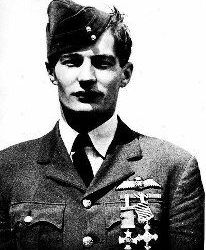
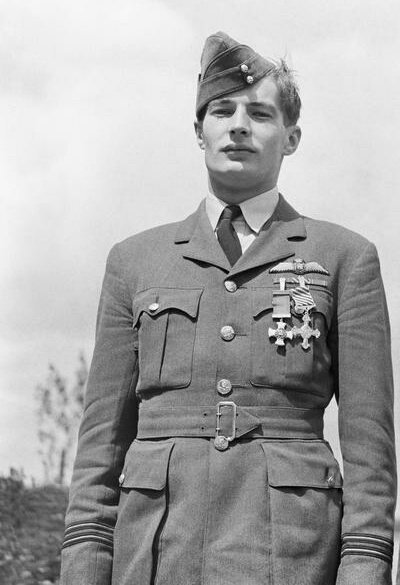
this young fella is No. 85 Squadron’s Hurricane pilot Richard Lee. he was awarded the DFC and DSO for his service, just a couple months before he was shot down over the English Channel on 18/8/1940, at age 23, sadly never to be seen again.
details under the cut -
Richard Hugh Anthony Lee was born in London in 1917 (the exact date or month is unknown). Growing up, he went to Charterhouse School.
On September 1935 he joined RAF Cranwell as a Flight Cadet, and graduated in July 1937. He was posted to Debden on June 1, 1938 to join no.85 Squadron at its reformation. He flew Gloster Gladiator biplanes to begin with, before no.85 was re-equipped with Hawker Hurricane Mk1s.

No.85 sqn. Was posted in France to protect cross-channel convoys. On November 21, 1939, while on patrol over Boulogne, Flight Lieutenant ‘Dickie’ Lee scored the squadron’s first victory when he successfully attacked a Heinkel 111 which crashed into the channel and burst into flames. This also scored the Squadron’s first accolade as he was awarded a DFC on March 8, 1940 “for outstanding brilliance and efficiency”
Not much happened over the winter. That was to change, however, when on May 10, 1940, the sound of Anti Aircraft guns and Luftwaffe planes filled the air. No. 85 squadron immediately jumped into action, and within a few minutes, one section of “A” flight, and one section of “B” flight were up in the air. Lee was leading B flight with Flying Officer Derek Allen and Pilot Officer Patrick Woods-Scawen flying as his numbers 2 and 3 respectively. the section attacked a Henschel 126, and managed to severely damage the aircraft, leaving two of its crew wounded.
Later that morning, Lee was flying Hurricane L1779 into combat, leading his section again. They engaged a Junkers-88 at about 15,000 feet. His combat report reads: “after being sighted E/A dived to a very low height. i could only overhaul from astern very slowly. From 500 yards to 700 yards the enemy rear gunner fired continuously. I fired short bursts and finished ammunition closing to 200 yards. No apparent results except black smoke from one engine. My own aircraft shot badly.”
Later that evening Lee shared in the destruction of a Ju-86 with his section. Lee was the first to open fire and set the enemy’s starboard engine on fire. When they landed, ground crew found that he had fired 50 rounds from each of his eight Browning machine guns during the engagement.
on 11/5/1940, the squadron was back in the thick of it. however, this time after a busy morning patrol, Allen and Woods-Scawen returned without their section leader. Richard Lee was missing. He’d been flying Hurricane N2388, code marked ‘VY-R’ over Maastricht when he engaged a Dornier 17P at approximately 1300 hours. His aircraft had been hit by Anti Aircraft fire and he bailed out of his aircraft slightly wounded. Parachuting down, he landed in a field, where he spotted a local man passing by. He asked the man which direction he should travel to get to the Belgian tanks that were nearby. He took off in the direction, only to find out that they were, in fact, German. Lucky for him, his uniform was concealed underneath a smock or overcoat he had acquired. He was believed to be a peasant and was locked into a barn with some other refugees. Thinking quick, he climbed up to a window and noticed a ladder perched beneath it, and promptly climbed out, walked several miles, and hitched a ride with some Belgians before returning to his unit the very next day. The squadron’s diarist reported that “11/5/40. Eight E/A were shot down today. Flight Lieutenant R.H.A Lee failed to return from the offensive patrol covering the advance of the BEF over the Tongres-Maastricht Section – he was reported last seen on a Dornier’s tail at about 2,000 ft.”
On May 22, No. 85 squadron started to return to Debden to re-equip and reform, and Lee was transferred to No. 56 Squadron. The next day the squadron engaged enemy aircraft over St. Omer while patrolling Manston to Dunkirk. he expended all his ammunition in the dogfight that ensued between the Hurricanes and the 109s, before his starboard wing was badly hit. He broke off and returned to Manston unharmed, and aircraft deemed repairable.
On May 27, he flew another offensive patrol from Manston with the Squadron, flying Hurricane P3311. On this occasion he was shot down by Messerschmitt 109s during an attack on Henschel 111s. he ditched his aircraft in the sea and was fished out of the water and taken ashore an hour later.
On May 31, Lee was awarded the DSO. The London Gazette published the following: “Flight Lieutenant Richard Hugh Anthony Lee, D.F.C. (33208) this officer has displayed great ability as a leader and intense desire to engage the enemy. On one occasion he continued to attack an enemy aircraft after his companion had been shot down, and his own machine hit in many places. His section shot down a Dornier 215 in flames one evening in May, and another in the course of engagement the next day. In his last engagement, he was seen at 200 feet at the tail of a Junkers 89, being subjected to intense fire from the enemy occupied territory. This officer escaped from behind the German lines after being arrested and upheld the highest traditions of the Service.”
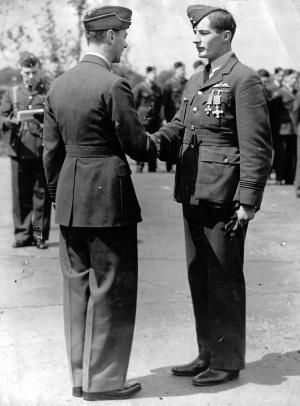
In June, he returned to No. 85 squadron, under Squadron Leader Peter Townsend. His experience was called upon to help bring the new recruits upto scratch before the squadron was again ready for operational flying.
On June 26, Richard Lee and his close friend Gerald Lewis flew to an investiture where Lee received his DSO and DFC for his service.
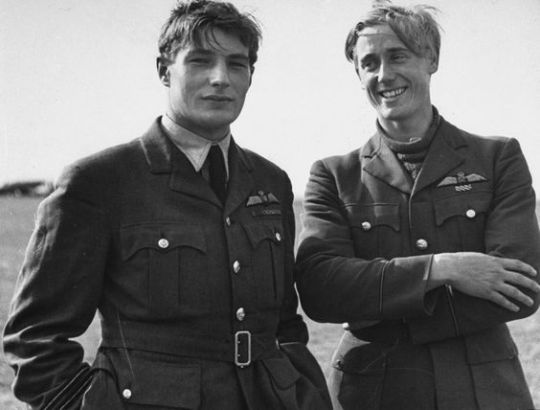
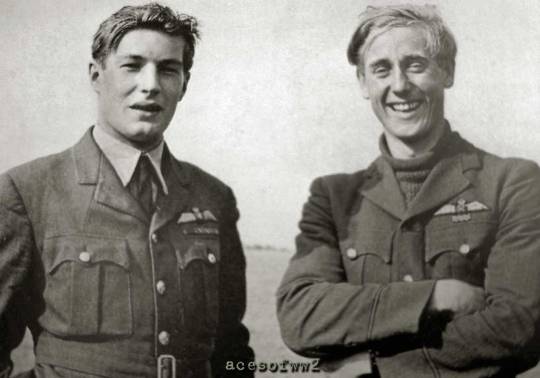
Lee’s reputation as a daring and aggressive fighter pilot was quickly spreading around the air force. Peter Townsend’s good friend Flight Lieutenant John Simpson wrote a letter to his intelligence officer, after hearing about the exploits of Richard Lee.
Simpson, who also coincidentally often flew with Patrick Woods-Scawen’s younger brother Tony, wrote “I hear that Dickie Lee has done wonders. You see how these boys, who were always looked upon as being the naughty ones, are doing so well. They needed a war to convince the old gentlemen at Whitehall. Do you remember that Dickie was almost given his bowler hat for low flying? The same low flying has apparently stood him in good stead.” (apparently he had flown through an open barn, but i have no way of confirming or denying that)
In Hector Bolitho’s book Combat Report published in 1943, he wrote of an afternoon spent with Lee, Townsend and Simpson. “Peter Townsend and Dickie Lee had been posted to an aerodrome a few miles from the house… in the early summer, John and I went out to find them… we found Peter and Dickie and took them back to the house. Dickie followed the car on a hellish motor bicycle.
It was a pleasant enough afternoon and we lay on the lawn, the four of us, with a bowl of ice, a bottle of gin, some tonic water and four glasses, and talked the world away. All three, looked older. Both Dickie and Peter had been shot down and a certain solemnity seemed to have touched them. Dickie had changed more than others.
We used to call him Dopey in the old days because he always fell asleep if the conversation took a serious turn. He was already a hero and in most newspapers there had been photographs of him receiving his decorations from the King. The long hell in France had left creases at the corners of his sleepy eyes. But he would have none of our attempts at war talk. He said that he had a date with a blonde in Saffron Walden and that he could not stay very long.
Dickie’s taste in blondes was not always reassuring to his friends, but he was obviously more concerned with his date than with our efforts to make him talk about how he has won the DFC and DSO on his tunic. I remember when he stood to go I noticed a hole in the leg of his trousers where a bullet had gone through without touching his skin.
I suppose that Peter and John and I were a bit pensive, being the older ones, so Dickie yawned and said ‘Well, I must get cracking’ he made one gesture to sentiment before he went. On the day that was declared he left his favourite pictures with me… before his squadron flew off to France.
They were photographs of friends, of aircraft, and one of a spaniel. He asked me for them, so I brought them down from the attic and he flew off to his blonde with them, piled before him on the screeching, violent motor bicycle.”
August 18, 1940 “the Hardest Day” of course, was when Dickie was lost. Flying as Blue 1 in Hurricane P2923 ‘VY-R’ during this patrol, he was last seen by Squadron Leader Townsend and Flying Officer Arthur Gowers ten miles north-east of Foulness Point chasing Bf 109s out across the Channel.
In Townsend’s book Duel of Eagles he wrote the following of Lee’s last action: “Come back, Dicky,’ I called but he was drawing away. Again and again I called, but he kept on. It was useless to chase Huns out to sea; they would be back again the next day. Something had gotten into Dicky and there was no stopping him. We were both low on fuel and I was out of ammunition. There was only one thing to do: turn back”
Like several others, he was gone too soon. Neither his aircraft nor his body were ever recovered. and aside from these mentions, and a few documents, and acknowledgement on the Runnymede Memorial, Panel 6, there isn’t much about him out there. there’s really not much one can do about that either, other than remember, and keep them alive in our thoughts; those who never returned, whose names faded into obscurity.
Source
#my last post was glitching out so i had to make a new one#sigh. i miss him. that 'age 23' really hits hard man#history#ww2#wwii#battle of britain#raf#1940s#1940#need i repeat it again ? war bad.#i wish he had a happy ending like charlie and gertie in that other post but alas#also this is all the information i could find about him on the internet#that blogspot article is the only comprehensive source#there's just tiny bits and pieces of him scattered in databases and they're not much use at all to be quite honest#there is only one thing i know right now and that is that i miss him dearly for some reason#even though i dont even know anything about him except all of.... this#and the pictures in this post are all the pictures of him that are out there#i mean there's more but they're just colourisations of these#especially of the one with his pal lewis#and the one in which he's standing with the medals on his uniform#sweet boy i miss him. precious lad.#i say knowing absolutely nothing about him#like he was literally just some guy. he wasn't famous or anything. there aren't even any letters by him out there#so that i can even start to build an accurate profile. i guess all that i have is the photos and mentions#and where are those photos that he took with him ? did they go with him ? or are they in someone's basement#forgotten and neglected. or did they get destroyed ? where are they !#my best hope is that they're somewhere out there in a basement or something along with a pile of letters#his body or plane were never recovered and that makes me want to cry and sob and weep#i pretty much am over my other crush but this man has been on my mind for over a year now#its like sir please
48 notes
·
View notes
Photo

Today is the thirtieth day of the Omer, which is four weeks and two days of the Omer.
Find the blessing here.
Subscribe to get the GIF Omer in your email daily.
Note: 30 = ל
12 notes
·
View notes
Photo
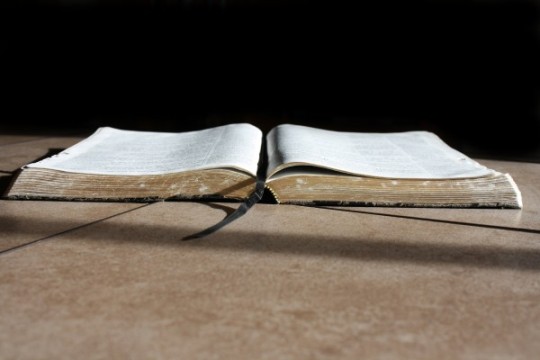
9 Then Moses said to Aaron, “Announce this to the entire community of Israel: ‘Present yourselves before the Lord, for he has heard your complaining.’” 10 And as Aaron spoke to the whole community of Israel, they looked out toward the wilderness. There they could see the awesome glory of the Lord in the cloud.
11 Then the Lord said to Moses, 12 “I have heard the Israelites’ complaints. Now tell them, ‘In the evening you will have meat to eat, and in the morning you will have all the bread you want. Then you will know that I am the Lord your God.’”
13 That evening vast numbers of quail flew in and covered the camp. And the next morning the area around the camp was wet with dew. 14 When the dew evaporated, a flaky substance as fine as frost blanketed the ground. 15 The Israelites were puzzled when they saw it. “What is it?” they asked each other. They had no idea what it was.
And Moses told them, “It is the food the Lord has given you to eat. 16 These are the Lord’s instructions: Each household should gather as much as it needs. Pick up two quarts for each person in your tent.”
17 So the people of Israel did as they were told. Some gathered a lot, some only a little. 18 But when they measured it out, everyone had just enough. Those who gathered a lot had nothing left over, and those who gathered only a little had enough. Each family had just what it needed.
19 Then Moses told them, “Do not keep any of it until morning.” 20 But some of them didn’t listen and kept some of it until morning. But by then it was full of maggots and had a terrible smell. Moses was very angry with them.
21 After this the people gathered the food morning by morning, each family according to its need. And as the sun became hot, the flakes they had not picked up melted and disappeared. 22 On the sixth day, they gathered twice as much as usual—four quarts for each person instead of two. Then all the leaders of the community came and asked Moses for an explanation. 23 He told them, “This is what the Lord commanded: Tomorrow will be a day of complete rest, a holy Sabbath day set apart for the Lord. So bake or boil as much as you want today, and set aside what is left for tomorrow.”
24 So they put some aside until morning, just as Moses had commanded. And in the morning the leftover food was wholesome and good, without maggots or odor. 25 Moses said, “Eat this food today, for today is a Sabbath day dedicated to the Lord. There will be no food on the ground today. 26 You may gather the food for six days, but the seventh day is the Sabbath. There will be no food on the ground that day.”
27 Some of the people went out anyway on the seventh day, but they found no food. 28 The Lord asked Moses, “How long will these people refuse to obey my commands and instructions? 29 They must realize that the Sabbath is the Lord’s gift to you. That is why he gives you a two-day supply on the sixth day, so there will be enough for two days. On the Sabbath day you must each stay in your place. Do not go out to pick up food on the seventh day.” 30 So the people did not gather any food on the seventh day.
31 The Israelites called the food manna. It was white like coriander seed, and it tasted like honey wafers.
32 Then Moses said, “This is what the Lord has commanded: Fill a two-quart container with manna to preserve it for your descendants. Then later generations will be able to see the food I gave you in the wilderness when I set you free from Egypt.”
33 Moses said to Aaron, “Get a jar and fill it with two quarts of manna. Then put it in a sacred place before the Lord to preserve it for all future generations.” 34 Aaron did just as the Lord had commanded Moses. He eventually placed it in the Ark of the Covenant—in front of the stone tablets inscribed with the terms of the covenant. 35 So the people of Israel ate manna for forty years until they arrived at the land where they would settle. They ate manna until they came to the border of the land of Canaan.
36 The container used to measure the manna was an omer, which was one-tenth of an ephah; it held about two quarts.
— Exodus 16:9-36 | New Living Translation (NLT)
Holy Bible, New Living Translation, copyright © 1996, 2004, 2015 by Tyndale House Foundation. All rights reserved.
Cross References: Genesis 2:3; Exodus 6:7; Exodus 12:10; Exodus 13:21; Exodus 16:7; Exodus 20:9-10; Exodus 25:16; Exodus 34:31; Numbers 11:7; Numbers 11:9; Numbers 28:5; Deuteronomy 8:3; 2 Kings 17:14; John 6:31; Acts 7:36; 2 Corinthians 8:15; Hebrews 9:4; Revelation 2:17
#Israel#complaining#Manna#Lord#Exodus 16:9-36#Book of Exodus#Old Testament#NLT#New Living Translation#Holy Bible#Tyndale House Foundation
5 notes
·
View notes
Text
Hazrat Abu Bakr (radıyallahu anh) - The First Caliph of Islam

The first caliph of Islam was Hazrat Abu Bakr, who was the closest friend and confidant of the Prophet.
HE; With his unwavering faith, loyalty, and approval, he had the hopes of being Siddiq. As the first lucky ones to accept the invitation to Islam, after the ascension event, against the ridicule of the polytheists;
"If he said it is true!" He declared his slot in a totally different form.
In the turmoil of assassination schemes to the Honorary Kainat in Mecca, in the service of his children, together with our Prophet on the journey of migration, in the Cave of Sevres, in the words of the verse; «The second of the two» had the honor of being the life friend of Rasulullah in the cave.
The Prophet Muhammad’s (PBUH) Love for Hazrat Abu Bakr
One day, the Prophet (peace be upon him) said:
He said, "I did not benefit from anyone else's property as much as I used Abu Bakr's property ...".
Hazrat Abu Bakr -radıyallahu anh- greeted these words with tears:
"I and my property, aren't we only for You, O Messenger of Allah ?!" (Ibn-i Mâce, Fedâilu Companions of the Prophet, 11) and declared in a burnt manner that he devoted himself to the Prophet with everything and that he was frivolous in Him.
Hazrat Abu Bakr Throughout his life, he had been in the service of our Prophet with his life, possessions, and children, rejoiced for him, felt sorry for him and worried about him. In the Cave of Sevres, where spiritual guidance also took place, the secret of merit with Allah and His Messenger was manifested:
Hazrat Abu Bakr -radıyallâhu anh- narrates:
While we were in the cave with the Prophet (peace be upon him) on the journey of migration, I saw the feet of the polytheists wandering over us and;
“–O Prophet of Allâh! If one of them bends down and looks down, he will surely see us! ” I said.
The Prophet (peace be upon him) said,
"- What does one think (and what does he believe them) of two persons, the third of whom is God, O Abubekir?" (Bukhari, Tafsir, 9/9; Ashabun-Nebi, 2; Muslim, Fedailus-Companion 1)
The generosity of Hazrat Abu Bakr
An important part of the first Muslims had been honored with the efforts of Hazrat Abu Bakr. He spent his wealth, which he earned through honest and clean trade, to save by buying slaves who moan under the persecution of their polytheist masters. The following verses were sent down to praise his generosity:
His father, Abu Kuhafe, who is not yet honored with faith; Seeing that his son spent all his wealth to buy weak and feeble slaves and advised him to buy strong slaves who would at least be useful to him, Hazrat Abu Bakr -radıyallahu anh-; He replied that he had no consent other than Allah's approval. This answer was praised in the verse as follows:
"Those who give their property to good people to be cleaned are kept away from it (fire). There is no blessing to be received with gratitude for anyone other than asking for the approval of your Almighty Lord. And he will be pleased (by receiving the approval of his Lord) . " (al-Leyl, 17-21)
Hazrat Abu Bakr, who attained an unprecedented position in generosity; He was a hero of sincerity, trust and conviction who spent all his possessions when he invaded. He was a witness of forgiveness and mercy at a level that would not cease to help even those whose name was involved in the hypocrites' slander campaign against his daughter Hazrat Aisha.
Before becoming caliph, Hazrat Abu Bakr would milk the sheep of the orphans around him and meet their needs.
After becoming Caliph, “Now he has become a huge caliph; As their occupations increase and life conditions will change, they will probably not milk the orphans' sheep from now on. " they began to think. However, nothing changed. In the same humble manner, he continued to milk the sheep of the orphans and meet their needs personally. (Suyuti, Tarihul - Hulefa, p. 80; Sarıcam, Hz. Abubakar, p.82 )
Hazrat Abu Bakr -radıyallahu anh- was always in the first place in all righteous deeds and charities.
It is stated in the hadith that Hazrat Abu Bakr will be invited from all the gates of Paradise because of his lofty virtue of righteous deeds. It is reported that the nickname Abu Bakr was given to him because he ran for every charity work first and early.
The Closeness with Prophet Muhammad (PBUH)
Hazrat Abu Bakr -radıyallahu anh- was experiencing a completely different closeness and a secret state of privacy with our Prophet (peace be upon him). He was exemplary of our Prophet to a degree that no other Companions could have had.
Hazrat Omer, who witnessed his conversations with the Prophet one day, describes this situation as follows:
“I entered the presence of the Messenger of Allah. They were chatting with Hazrat Abu Bakr -radıyallâhu anh- about ilm-i tawhid. I sat between them. I did not understand anything from your words as if I did not speak Arabic;
«–What is this state of affairs? Do you always converse with the Prophet - peace be upon him and peace be upon him? » I asked.
Hazrat Abu Bakr -radıyallâhu anh-; «- Yes, sometimes we chat alone with the Messenger of Allah (peace be upon him). he replied.
When Hazrat Abu Bakr was chosen as the caliph after the death of our Prophet (PBUH), he made a great humility and nothingness to people as follows:
"O, people! Although I am not the best of you, I have been chosen for you. Help me if I do my duty properly. If I act wrong, show me the right way ... ” (Ibn-i Sad, III, 182-183; Suyuti, Tarihul - Hulefa, p.69, 71-72; Hamidullah, Prophet of Islam, II, 1181)
In fact, Hazrat Abu Bakr was indeed the most virtuous person among the Companions after our Prophet. However he;
“He is the servant of the Most Merciful, who walk on the earth with dignity and humility…” (al-Furkan, 63) lived in a state of destitution and nothingness in order to enter into the scope of the verse.
After the death of the Prophet, his desire to meet him intensified due to this firak.
Aisha expresses the enthusiasm of the Prophet at the moment of her father's death as follows:
“My father Abu Bakr -radıyallâhu anh- in death;
«–What day is it today?" asked.
"-Monday," we said.
«–If I die tonight, don't make me wait for tomorrow! For, for me, the loveliest of days and nights is the closest to the Prophet - peace be upon him. (That is the moment when I will meet him as soon as possible.) »He said." (Ahmed, I, 8)
The Beautiful Words by Hazrat Abu Bakr
A bunch of the wise words of this person who was the master of luck, loyalty, and merit, who grew up in the discipline of our Prophet, the Honorary of the Universe:
"Four people are among the righteous servants of Allah:
1. He rejoices when he sees the repenting person (with pleasure that he enters the path of salvation).
2. Who pleads with his Lord for the forgiveness of sinners. (The horizon and an indicator of mercy that a believer should have)
3. Those who pray to their religious brother in their absence. (Who does not hold grudges against anyone in his heart, does not harbor burden does not offend)
4. Helping and serving a person in need of himself. (Who is conscious of being entrusted with what Allah Almighty has bestowed upon him and to be able to perpetuate the creation)
“In my sight, the strongest of you is the one who is weak until he gets his due. The weakest of you is the strong person until someone else is entitled to him. "
“If man only stayed in mosques (if he remained alone, not reflected in life); goods, in misers; weapon in cowards; if the authority is weak, things will deteriorate. "
"Think carefully about what you said when you said it, and to whom!"
"Do not brag! What good is it for the boast of man, who was created from the earth and will eat himself by wolves and insects when he returns to the earth!
"Treat yourself in order that people will treat you well!"
"Runaway from fame, honor will follow you."
"Be ready for death in order that you'll tend life eternal."
"Allah mentions the reward he will concede the Quran alongside the torment in order that the servant will demand worship and fear torture."
2 notes
·
View notes
Text
Saint of the Day – 22 July – St Wandrille of Fontenelle (c 605–668) Priest, Monk, Abbot – born c 605 near Verdun, Austrasia (in modern France) and died on 22 July 668 of natural causes.

Born in the Verdun region at the beginning of the 7th century, into a family related to the mayor of the palace, Pépin d’Héristal, father of Charles Martel, Saint Wandrille entered the Court of King Dagobert I at a young age, who granted him the title of count and entrusted him with the administration of the royal domains.
He carried out his office with loyalty but his preference led him to lead a life consecrated to God. He had also made a spiritual friendship with other dignitaries, such as Didier the treasurer and Dadon the chancellor, who led a life of mortification at court. Married out of obedience to his parents, Wandrille agreed with his wife to keep their virginity and both retired to a Monastery.
He, therefore, retired to one of his properties in Lorraine, called Montfaucon, near the Holy Hermit Baldric. Informed of his defection, King Dagobert summoned Wandrille, who appeared at the palace in his ascetic garment but beaming with celestial brilliance and obtained from the king his authorisation to leave the world. He then went to the Jura, to restore the Hermitage founded by Saint Ursanne.
Following the tradition of the Irish Monks and of Saint Columban, he led an extremely mortified life, spent almost all his sleepless nights, barefoot, reciting Psalms and when temptations oppressed him, he would throw himself into a frozen pond. Desirous of assimilating more fully the heritage of Saint Columban, he went to the Monastery of Bobbio, founded by the latter in Italy and there he learnt perfection in the experience of community life.
Back in Gaul, he stopped at the Monastery of Romainmoutier which had been restored by disciples of Saint Columban and lived there for ten years.

Warned by an Angel of the mission he had to undertake for the salvation of many souls, he left Jura for Neustria. In Rouen, he found his friend Dadon, who had become a Bishop under the name of St Ouen and was Ordained by him as a Deacon.
After having received the Priesthood from the hands of Saint Omer, Bishop of Thérouanne, he assisted Saint Ouen in the evangelisation of his Diocese. After a few years (649), the heart still altered from the conversation with God in solitude, he obtained the authorisation of his Bishop to settle in the marshy valley of Fontenelle, in the forest of Jumièges, acquired by his nephew, Gond who had decided to give up the world.

Ruins of the original Fontanelle Abbey built by St Wandrille
Striving with tireless zeal to clear the land, Wandrille and the growing number of disciples who had gathered around him, built four churches and cells there. Showing the example in manual work, the Saint was the first for Prayer and he taught his monks to strive always forward towards perfection, saying: “We must not count the years that we have spent in the Monastery but rather, those which we have spent in the irreproachable practice of the divine commandments. May fraternal charity be your link and put yourselves at the service of one another. Your adversary, the devil, seeing you united in this way, will flee very far, for he cannot approach the one whom he sees united in mind and heart with those around him.”
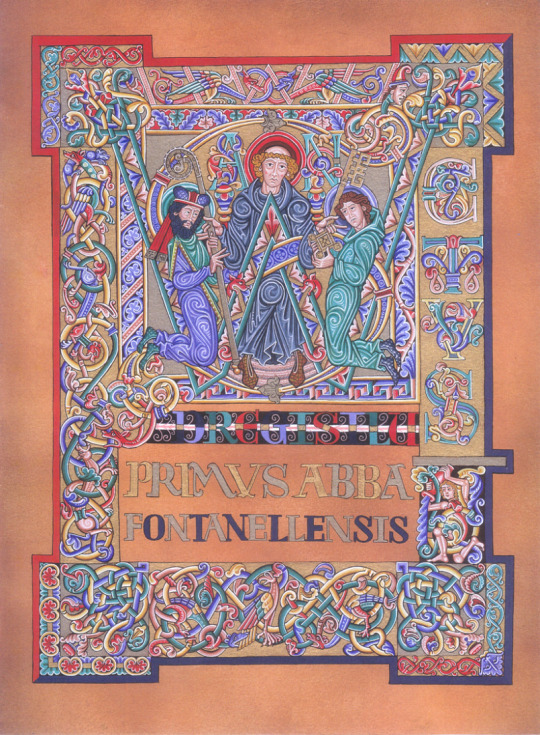
Wandrille only left the Monastery to preach to the pagans of the region, or to go and found other Monasteries, five in number, organised like Fontenelle by harmonising the Irish tradition of Saint Colomban and the rule of Saint Benedict which was beginning to take hold and spreading in France. Below is the New Benedictine Fontanelle Monastery on the same site as the original.
This slideshow requires JavaScript.
Having ruled his Monastery for nineteen years, Saint Wandrille, who lamented to remain in exile on earth, fell ill and went into a three-day ecstasy, during which he saw the door of heaven open and the throne of glory which was prepared for him.
Returning from this vision, he exhorted his disciples to mutual charity, appointed his successor and smiling at the Angels and the Saints who had come to welcome him, he fell asleep in peace, on 22 July 668, in the presence of Saint Ouen and of his three hundred disciples.
He was buried at Fontanelle but during the Viking invasions, Wandrille’s relics were dispersed to various locations and shared between various churches, including the abbey of Saint-Pierre-au-Mont-Blandin in Ghent (now in Belgium). Wandrille’s cult was celebrated in England prior to the Norman Conquest of 1066.
In the 19th century one of his relics remained – his skull was found in Liège. It was brought back to the Abbey, when the new church was dedicated in 1967. It can be seen today in a modern reliquary.
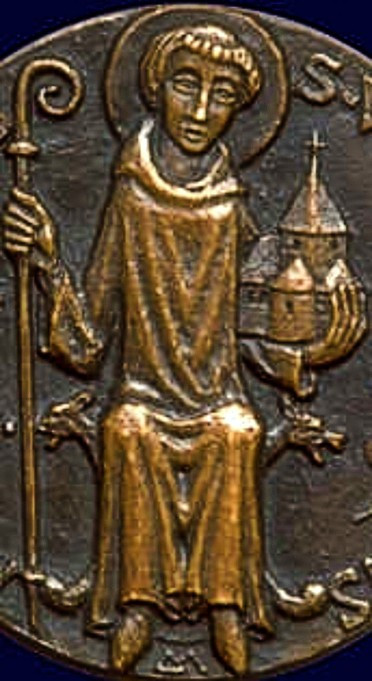
Wandrille is apparently a common name in France and in the new Monastery of Fontanelle, the Monks have established a “Wandrille Day” on the Memorial of St Wandrille. The day is devoted to Holy Mass, prayer and recreation too, celebrating all the many ‘Wandrilles’ of all ages, who attend. Such a lovely way of honouring St Wandrille’s feast!
Saint of the Day – 22 July – St Wandrille of Fontenelle (c 605–668) Saint of the Day - 22 July - St Wandrille of Fontenelle (c 605–668) Priest, Monk, Abbot - born c 605 near Verdun, Austrasia (in modern France) and died on 22 July 668 of natural causes.
1 note
·
View note
Text
Into the New Year for Jazz
I have submitted the following to a dear friend who runs the jazz show on Toledo Public Radio for inclusion on the website.
INTO 2020 WITH JAZZ SPECTRUM
Even as I gladly accept these invitations to sum up the year or, even this time, the decade, I don’t quite do as I’m told and so don’t color between the lines I’ve been given. Sorry.
Like you, our listeners, I rely on Jazz Spectrum to introduce me to current developments and to fill in gaps between 1982, say, and 2015 when, alas, jazz wasn’t my primary listening. It is again in no small measure due to this show that I am back in this wonderful game. I am developing enough current knowledge to be on the lookout for current players (let’s start with the members of Artemis who do fascinating work individually and collectively--more shortly) and trends, but I’m not auditioning dozens of recordings every week, putting together a four hour show, and doing all the work that makes the show such a resource.
So I don’t have a best of 2019 or best of the 2010s to offer. But, I do have some thoughts.. So, bear with me, or don’t and go re/read our host’s more fine grained observations.
In thinking about the impact on hip hop on this music, I offhandedly texted my old friend that jazz has always been fusion music. I didn’t happen to have a teenager bring home the latest incarnation of African American popular music, rhythm, and rebellion, so I’m learning about it indirectly when I see Terence Blanchard, Robert Glaspar, and Stefon Harris. Brilliant players all of them with crack bands and a deep grounding in the wider tradition from which they can bring the new energy into the music. Today I prefer pianos to guitars and acoustic instruments to electric ones, with little affinity for vocoders, looping, and effects. The beats are infectious and jazz drummers are amazing for their huge ears and magical abilities to move the beat around, using the timbres of the drums to comment on everything the rest of the band is doing. As an example I was just able to watch Nate Smith+Kinfolk via live streaming from our local club. He was a dynamo with as much energy and power as the rest of the band--solid and smooth as they are--combined.
Hip hop has to be part of what propels this rhythmic invention. If my kid perversely stuck with our traditional English and Celtic folk music, then, that I don’t get hip hop from him is my problem, not jazz’s. I embraced my generation’s fusions--rock, funk--and went back to Latin, Afro Cuban, rhythm and blues, show tunes, Third Stream, gospel, blues, and ragtime and saw them come into jazz. So I’m prepared intellectually at least to welcome these latest developments. These fusions have made and remade jazz, so yes it’s always been fusion music.
But let me borrow an idea from my quarter century looking at evolutionary biologist Edgar Anderson who worked at the Missouri Botanical Garden from 1922-1969. His signature idea was that repeated backcrossing is as important a source of genetic variation as mutations and thus gives natural selection something to work on. To apply it to jazz, it was jazz before and after Dizzy Gillespie started playing with Chano Pozo, but now we have Cuban and Latin and African rhythms in everyone’s musical DNA. All sorts of tunes from all sorts of players now can just naturally take on a Latin feel. It’s part of jazz that then continues to listen with its big big ears.
What has always excited me are these hybridizations and that is what will continue to invigorate the music into the 2020s.Kodri Gopalnath who died this October was not a jazz musician, but he brought the saxophone to Carnatic (Indian) classical music. Rudresh Mahanthappa studied with him and brought that tradition into his playing. It’s there now all the time whether in his reimagining of Charlie Parker on his 2015 album “Bird Calls” or with Rez Abassi in the Indo-Pak Coalition or his own “just jazz” gigs. This quote from his Wikipedia article captures this idea of introgressive hybridization: “In a 2011 interview with Westword newspaper about the resulting album, Samdhi, Mahanthappa said, "my idea was to take whatever I learned—take that knowledge—and really put in a setting that has nothing to do with Indian classical music.” https://en.wikipedia.org/wiki/Rudresh_Mahanthappa
Since some of Miles Davis’s 1970s work incorporated sitars and tablas and remembering John Coltrane’s “India,” this music has been in the mix for decades. It prompted a “Miles from India” two-CD set from 2008. I try to keep an eye on Mahanthappa, Abassi (recording 1970s fusion tunes acoustically is damned clever), and especially Vijay Iyer to watch how jazz varies and is enriched. I saw Iyer with his trio in 2016 catching extended hypnotic improvisations, one phased into “Epistrophy” before churning on. He has recorded in lots of other settings, including duos with Wadada Leo Smith and Craig Taborn and with a sextet. It is important music.
That’s one hybridization that backcrosses into jazz. Another is with Middle Eastern, including Israeli, music.Abdul Al-Malik recorded on oud as well as bass in the late 1950s and early 1960s and Anour Brahem played oud with Dave Holland and Jack DeJohnette on “Blue Maqams” in 2017. Those are first generation crosses. It’s when someone like Omer Avital plays jazz informed by his Israeli upbringing that the introgression happens, when there are new scales, new rhythms to incorporate. Avital’s own albums and with the OAM trio (including a set with the intriguing tenor Mark Turner) are favorites. I also owe Jazz Spectrum an exposure to the Chicago trumpeter Amir ElSaffar and his Two Rivers Project which explores his Iraqi roots in a jazz context.
Anat Cohen is an exuberant player, exuding joy at what she and her bands do. She has played with her brothers, Avishai and Yuval, with lots of Israeli in the mix, but she has Brazilian and Edith Piaf too. She is in the multinational band Artemis: two Canadians--leader Renee Rosnes and trumpeter Ingrid Jensen, Chilean Melissa Aldana on tenor, bassist Noriko Ueda from Japan, and the lone American, and the amazing drummer Alison Miller. Their debut album, probably with Cecile McLorin Salvant, will be a highlight of the coming year as their run here in St. Louis this October was.
I am particularly astounded by what drummers are doing these days. Of course, there are sources--Max Roach, Jack DeJohnette’s insistent but subtle cymbals--and Art Blakely and Elvin Jones were not simply powerful engines driving the band. But Miller is a fine example of, call it, “melodic drumming” where each drum/brush stroke is perfectly placed on the drum head, cymbal, even rim or side of the drum, to deliver not just a beat but a harmonic/melodic comment on the rest of the band. There are so so many players and they make just about every show I see special. Witnessing the magic in the making is why live performance is so much richer than recordings.
But to return to hybridizations, starting at least with Mid East ones, let me focus on London as a key world center for this music. Precisely as the still Metropolitan center of a thankfully fading empire (Imagine there’s no countries/It isn’t hard to do/Nothing to kill or die for), it is a hybrid zone. Yazz Ahmed is a Bahrani-Brit whose trumpet playing is enriched as she explores her Arab heritage. She does exciting stuff and has followed up “La Saboteuse” with “Polyhymnia” this year. Shabaka Hutchings has Barbadian heritage and brings that to his tenor and several key projects in the London scene. I’m drawn to the intensity of Sons of Kemet where he solos over Theon Cross’s tuba and two drummers, but Hutchings also works with The Comet Is Coming and The Ancestors. I’m a sucker for low brass, so I keep an eye on Cross too and he has his own FYAH released and is in the SEED Ensemble.
That London is a major jazz center is a development worth monitoring. I think it speaks to the vibrancy of this music and the role of these hybridizations in keeping it so exciting.
I am eager for the 2020s.
1 note
·
View note
Text
Betrayed Again
Like most readers, I suspect, I was upset—but not that shocked—by the decision of the Naftali Bennett government to go back on the P.M.’s unambiguous pre-election promise to implement the 2016 agreement to create a space for non-Orthodox (i.e., non-gender-segregated) prayer at the Western Wall in Jerusalem. That agreement, which took years to hammer out, was suspended first by the Netanyahu government in 2017. But many of us, apparently naively, expected P.M. Bennett to be a man of his word and to unfreeze—and actually implement—the agreement when he came to power. And, indeed, after the initial announcement was made, Foreign Minister Yair Lapid did issue a statement in which he vaguely promised—without using anything remotely like the language of real commitment or intention—to implement the agreement sometime within the next four years. We’ll see. I certainly wouldn’t bet on it. In fact, I’ll be amazed if the current government follows through on its own commitment.
The responses were entirely as any savvy observer would have expected. Yes, it was almost amusing to watch members of the government scrambling for cover by blaming their own lack of moral backbone and commitment to their own commitment on anyone other than themselves. (For a survey of those efforts, I recommend David Horovitz’s Times of Israel article on the topic, which you can access by clicking here.) From the leadership of the Conservative/Masorti and Reform movements in Israel came the expected statements of outrage, some more angry and others more wearily depressed. From the leaders of those same movements outside of Israel, some statements issued were more disappointed and others more self-righteous (i.e., in the you-expect-our-unwavering-support-yet-you-feel-free-to-stab-us-in-the-back mode). But the common theme that surfaced in them all were intense irritation at being confronted with yet another broken government promise and, yes, a sense of true betrayal.
I personally feel trapped by decisions like this one: eager to be as supportive of Israel as ever and yet, at the same time, unable to explain to myself how the leaders of Israel’s government can betray their commitments so callously. And this from a government that spends a fortune to maintain an actual Diaspora Affairs Ministry headed by an actual cabinet official, M.K. Omer Yankelevich. At the very least, she should have resigned in protest. But I could not find a single statement from her office responding directly to the Bennett government’s decision to abandon the Kotel agreement.
To explain how the Bennett government can behave so callously towards the very people on whose unwavering support it also wishes to count, I would like to draw my readers’ attention to a historical personality only rarely considered a player in modern Israeli politics: Napoleon Bonaparte, whose two-hundredth yahrtzeit fell just this last May.
There’s a lot to say about Napoleon’s 1797 series of battles in today’s Israel. To understand what the man was doing in the Middle East in the first place, however, it is necessary to step back far enough to take in the larger picture of world politics at the end of the eighteenth century. In 1796, Napolean became the leader of France after undertaking successful campaigns against the Austrians and their Italian allies. But the real objective of French expansionism was neither Austria nor Italy, but England. Nor was the French government unclear about its ultimate objective, talking openly about the idea of a march on London. But invading the British Isles was something that was beyond the capacity of the French forces of the day and they knew it. And so Napolean, then not even thirty years old, was dispatched to fight the British elsewhere than on home soil by making the Mediterranean into a “French lake” that would not tolerate incursions by British ships, thus ruining Britain’s capacity to trade freely in southern Europe and northern Africa. And so ensued a three-year campaign to wrest control of Egypt, and today’s Israel, Lebanon and Syria from the Ottoman Empire.
There were pitched battles in Egypt itself, but also at Jaffa, Akko, Gaza, El Arish, Haifa, and in the Galilee. The whole campaign was a disaster for the French—1,200 killed in action, 1,800 wounded, and another six hundred dead from disease (click here for some fascinating details about that last number). Napolean returned to Egypt and was victorious in some sea-based battles there, but he was ultimately unable to dislodge the Ottomans or the British from the Eastern Mediterranean and finally returned to France in defeat.
There are bits and pieces of Napolean’s legacy scattered around Israel, particularly in Akko. But the key to understanding the larger story—which is far more complicated than the scaled-down version offered above (click here for more details)—is that none of this had anything to do with the Jews of France…or of Israel. This was where Napoleon tried—unsuccessfully—to annihilate the forces arrayed against him. But to try to explain the whole episode as something of tactical or even spiritual importance for the Jews of the Land of Israel, or for the history of the Land itself, is to miss the point entirely: it happened there, but it wasn’t about the place in which it happened. This was about France and England mostly, and a little bit about France and the Ottoman Empire. It just happened in Israel, that’s all.
And the same could be said of the campaign of the British and Australian troops in today’s Israel during the First World War. The Battle of Beersheva is mostly forgotten today—but anyone who visits the Australian War Cemetery in Beersheva and sees the graves of more than 1100 young men, all of whom died on the same day in October 1917, will never forget the experience. Joan and I were there a few years ago and it was beyond chilling and, in its own way, just as suggestive to me of the horrors of war as were my visits to Gettysburg or Antietam. But the Battle of Beersheva, fought on Halloween in 1917, was just one of many battles fought by the British against the Ottomans and their German allies during the course of the First World War. Mostly forgotten or ignored today—when was the last time you read anything about the Battle of Raffa (January 1917) or the First or Second Battles of Gaza (March and April 1917, respectively) or the Battle of Mughar Ridge (November 1917) or even, most amazing of all, the Battle of Jerusalem, fought in the final two months of that same year, 1917?—these were the battles that changed the face of the Middle East permanently and irrevocably. (The best book on the topic I can recommend is David R. Woodward’s Hell in the Holy Land, World War I in the Middle East, published by the University Press of Kentucky in 2006.) But the point is that this had nothing to do with the Jews of Israel or of anywhere, and even less to do with the Holy Land itself: this was just where the Brits encountered the Turks and fought to the finish, not unlike the way that same place served as the setting for Napoleon’s war against the Ottoman Empire.
So that’s how I’m feeling about this week’s betrayal by the Bennett government of the Kotel Agreement: it’s a huge slap in the face of all non-Orthodox Jews and yet it’s not really about us at all and has to do far more meaningfully with the nature of the coalition that brought Bennett to power, a coalition that cannot survive if it alienates the dark forces of ḥareidi fanaticism too seriously…but which sees only benefit to appearing to side with them on an issue that matters to them far more than it does to most secular Israelis. Like Israel itself in Napoleon’s day, we Masorti Jews are just the backdrop to the real drama playing itself out—not the actors with speaking parts and certainly not the playwright. Nonetheless, explaining the repudiation of the Kotel agreement as a function of the Prime Minister’s need to grovel before the ḥareidim doesn’t make it sting less or hurt less. Nor does understanding that the government’s actions were far more cynical than hostile make their betrayal of their own promise any more palatable.
My deep attachment to the State of Israel is not based on any specific personality, political or otherwise. It is a function of my faith in God and my Jewishness on its most basic level. I find it perfectly possible to be disgusted with the government and, at the same time, to feel as allied as ever with the nation it purports to govern and with its people. That, of course, is what the Bennett government is counting on. But how else can I feel?
0 notes
Text
April 3rd, 2018 - 18th of Nissan, 5778
Yes, today is the fourth day of Pasover!
Omer: day three.
Tonight: count four.
48 notes
·
View notes
Photo

Today is the thirty-second day, which is four weeks and four days of the Omer!
הַיוֹם שְׁנַיִם וּשְׁלוֹשִׁים יוֹם שֶהֵם אַרְבָּעָה שָׁבוּעוֹת וְאַרְבָּעָה יָמִים לָעוֹמֶר׃
0 notes
Photo

Today is the twenty-eighth day of the Omer, which is four weeks of the Omer.
Find the blessing here.
Subscribe to get the GIF Omer in your email daily.
Note: 28 = כח
12 notes
·
View notes
Photo
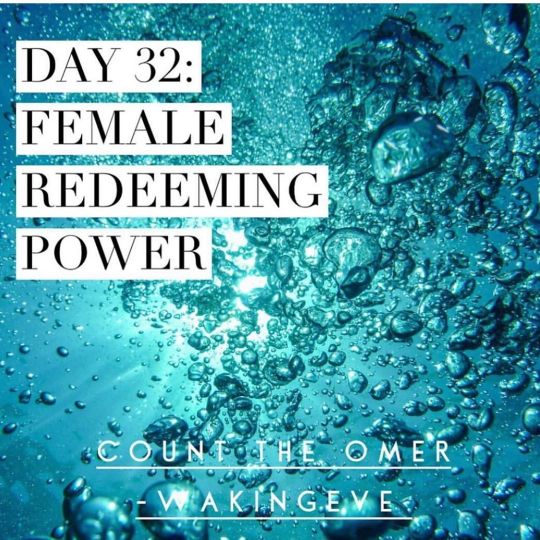
When you look carefully into the story of the Exodus, you see that the true redeeming force was the faith of the women. • Today, history is repeating itself. _ Tzvi Freeman, Bringing Heaven Down to Earth • 🌱Scripture Reflection: Luke 1:48 “for he has been mindful of the humble state of his servant. From now on all generations will call me blessed...” • Examine the strength and endurance of your humility. Does my humility withstand challenges? Am I firm in my positions or do I waffle in the name of humility? • Humility and modesty should not cause one to feel weak and insecure. Netzach of Hod underscores the fact that true humility does not make you into a "doormat" for others to step on; on the contrary, humility gives you enduring strength. Is my humility perceived as weakness? Does that cause others to take advantage of me? • 🌱Exercise for the day: Demonstrate the strength of your humility by initiating or actively participating in a good cause. • Today is Day Four of Week Five (32nd Day of the Omer) “Female Redeeming Power” 🌱 #countingtheomer #shavuot #countingup #pentecost #wordofgod #messianicjew #hebrewcatholic #bibleverse #faith #biblestudy #bible #torahforchristians #pesach #passover #readyingtheBride #growingrace #SacredWisdom 🌱 #ancientroots #WakingEve #SHEcountstheOmer https://www.instagram.com/p/CAIuLL-ATUp/?igshid=4grfhwy3ktdq
#countingtheomer#shavuot#countingup#pentecost#wordofgod#messianicjew#hebrewcatholic#bibleverse#faith#biblestudy#bible#torahforchristians#pesach#passover#readyingthebride#growingrace#sacredwisdom#ancientroots#wakingeve#shecountstheomer
0 notes
Text
to comfort One another with this hope
will you?
this is what Paul has instructed us to do while writing by the inspiration of the Spirit within as we read in his Letter of 1st Thessalonians with Today’s chapter #4:
So finally, brothers and sisters, in the name of our Lord Jesus, we ask you, we beg you to remember what we have taught you: live a life that is pleasing to God as you are already doing. Yes, we urge you to keep living and thriving in that life! For you know the instructions we gave you, instructions that came through the Lord Jesus. Now this is God’s will for you: set yourselves apart and live holy lives; avoid polluting yourselves with sexual defilement. Learn how to take charge over your own body, maintaining purity and honor. Don’t let the swells of lustful passion run your life as they do the outsiders who don’t know God. Don’t violate or take advantage of a fellow believer in such matters. As we told you before and warned you: the Lord will settle the score with anyone who does these things. Here’s why: God does not call us to live impure, adulterous, scandalous lives, but to seek holiness and purity. If you ignore this message, then you’re not only rejecting us but you’re rejecting God, the One who has given His Holy Spirit to live in you.
Now there’s no need for us to send you instructions on caring for your faith family because God Himself has already taught you how to love outside yourselves. And it’s evident you learned that lesson well by the way you love all the people of Macedonia. Brothers and sisters, we urge you to love even more and make it your goal to lead a peaceful life, mind your own business, and keep your hands busy in your work, as we have instructed you. That way you will live peacefully with those on the outside, and all your needs will be met without depending on others.
Brothers and sisters, we want you to be fully informed about those who have fallen asleep in death so that you will not be overwhelmed with grief like those who live outside of the true hope. Here’s what we believe: since Jesus died and rose again, in the same way, God will bring with Jesus all who have died through Him. For we can say all this to you confidently because it is the word of the Lord: we who are still alive and left behind when the Lord comes will not precede those who have fallen asleep in death. On that day, with a command that thunders into the world, with a voice of a chief heavenly messenger, and with a blast of God’s trumpet, the Lord Himself will descend from heaven; and all those who died in the Anointed One, our Liberating King, will rise from the dead first. Then we who are alive and left behind will be snatched up together with them into the clouds to meet the Lord in the air. This is how we, the resurrected and the living, will be with Him forever. So comfort one another with this hope, and encourage one another with these words.
The Letter of 1st Thessalonians, Chapter 4 (The Voice)
and paired with this is chapter 16 in the book of Exodus:
Then the entire community of Israel departed from Elim and entered the desert of Sin, which is located between Elim and Sinai. They arrived there on the fifteenth day of the second month after they had departed from Egypt.
As soon as they got to the desert of Sin, the entire community of Israelites complained to Moses and Aaron.
Israelites: It would have been better if we had died by the hand of the Eternal in Egypt. At least we had plenty to eat and drink, for our pots were stuffed with meat and we had as much bread as we wanted. But now you have brought the entire community out to the desert to starve us to death.
Eternal One (to Moses): Look! I will cause bread to rain down from heaven for you, and the people will go out and gather a helping of it each day. I will test them to see if they are willing to live by My instructions. On the sixth day, they will gather the usual amount; but when they go to prepare it, it will end up being twice what they usually gather.
Moses and Aaron (to the Israelites): When evening falls, you will know that the Eternal has led you out of the land of Egypt. In the morning your eyes will see His glory because He takes your complaints against us as complaints against Him. Who are we, that you direct your complaints to us?
Moses (continuing): This will take place when the Eternal One provides you with meat in the evening and plenty of bread in the morning because He hears all your grumbling and complaining against Him. Why do you complain to us? Your complaints are not against us, but against Him.
(to Aaron) Tell the entire community of Israelites, “Draw near to the Eternal. He has heard your complaints.”
While Aaron was speaking to the entire community of the Israelites, they all looked out toward the desert, and the radiant glory of the Eternal could be seen in the cloud. The Eternal spoke to Moses.
Eternal One (to Moses): Rest assured, I have heard the constant complaining of the Israelites. Tell them, “In the evening, you will have meat to eat; and in the morning, you will have enough bread to satisfy your gnawing hunger. Then you will know that I am the Eternal your God.”
That evening, quail flew in and covered the camp; and when morning arrived, what seemed to be ordinary dew was all around the camp.
But when the dew evaporated, it left behind a thin, mysterious, flaky substance that looked like frost on top of the dry desert ground. The people of Israel went out to examine it. They had never seen anything quite like it.
Israelites (to one another): What is it?
The people didn’t have a clue what this strange substance was.
Moses: It is the bread which the Eternal has given you to eat. Here are His instructions: “Gather only as much of it as you should eat by yourself. Pick up two quarts of bread for each person who lives in your tent.”
The Israelites did as they were told. Some people gathered a lot, others gathered less. When they used a two-quart jar to measure it, the one who had gathered a lot didn’t have more than he needed; and the one who gathered less had just what he needed. Miraculously, each person and each family—regardless of how much they gathered—had exactly what they needed.
Moses (continuing God’s instructions): Don’t try to keep any of it until the morning. Either eat it all, or throw it away.
But some people ignored Moses and tried to keep some of it until the next morning. Overnight it became wormy and started to have a dreadful smell. Moses became furious with them because they had disobeyed God’s instructions.
Every morning the people went out and gathered it—each family took only what it needed. By the time the sun became hot, it had melted away. On the sixth day the people went out and gathered, but they came back with twice as much as usual—four quarts per person. All the leaders of the community thought they needed to tell Moses what had happened.
Moses (to the leaders): Listen to what the Eternal commanded: Tomorrow, the seventh day, is to be a day of rest, a holy Sabbath dedicated to Him. Bake or boil whatever you need for today’s meals. Whatever is left over, keep it to eat tomorrow. It won’t spoil.
So the people stored some of it until the next morning, just as Moses had instructed. None of it spoiled, nor did it have any worms.
Moses: Eat what is left over today, because today is a Sabbath to the Eternal, a day of rest. You will not find any of it in the field today. You are to gather it for six days, but on the seventh day (the Sabbath), none of it will be on the ground.
When the seventh day arrived, some of the people ignored Moses and went out to gather it anyway; but there was none to gather.
Eternal One (to Moses): How much longer are you going to disobey My commands and instructions? Look! I have given you the Sabbath as a day of rest. That is why I give you an extra portion of food on the sixth day. Everyone should stay where they are and not go out to work on the seventh day.
So the people did as God directed and rested on the seventh day.
The community of Israel decided to name this mysterious substance “manna” (which means, “What is it?”). It was white like a coriander seed, and it tasted sweet like honey wafers.
Moses: This is the instruction of the Eternal: “Preserve two quarts of the manna so that future generations can see the bread I provided for you in the desert when I led you out of the land of Egypt.”
(to Aaron) Go, find a jar and fill it with two quarts of manna. Put it in a special place before the Eternal to preserve it for future generations to see.
Aaron did as the Eternal commanded. He stored the jar before the covenant to keep it safe.
For 40 years, the Israelites were sustained by the manna God supplied. They ate it until they arrived at the borderlands of Canaan, the edge of the land they would one day inhabit. (And their omer was a two-quart measurement and in turn was one-tenth of an ephah.)
The Book of Exodus, Chapter 16 (The Voice)
my personal reading of the Scriptures for Thursday, April 2 of 2020 with a paired chapter from each Testament along with Today’s Psalms and Proverbs
0 notes